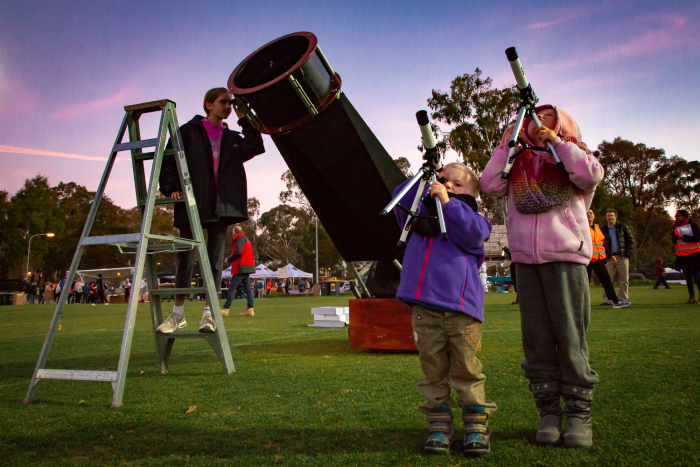‘Stargazing Live 2’
Many screen producers are dismayed that Screen Australia has rejected their case to deny funding for BBC Studios’ productions in Australia or to invest in local remakes of international formats.
The producers argue it is unfair to have to compete for production investment with the BBC, which runs six cable channels in Australia including BBC First and UKTV.
BBC Studios launched its Australian production hub in April, headed by Kylie Washington, formerly director of unscripted at Matchbox Pictures. Its first commission was Stargazing Live 2 for the ABC.
In a submission to Screen Australia signed by 38 production companies, producing teams and individual producers they said: “The ability of BBC Studios to apply for Screen Australia funding is a very worrying development and, we would have thought, an anomaly which is potentially very embarrassing for Screen Australia.
“In the UK, the BBC’s home market, broadcasters from other EU countries are not able to qualify as independent producers for the purposes of the UK quota system. They don’t even need to operate channels in the UK to be caught. But we have the opposite threat now here, with a company with local broadcast operations able to present itself as an independent production company for the purposes of Screen Australia funding.
“Funding a BBC production will knock out a local production company’s application. There is no incremental benefit from allowing a BBC entity to access SA funding.”
The Screen Australia board has rejected the producers’ arguments. “Screen Australia’s view is that competition for its direct funding is to be encouraged as it ensures well developed projects, high-quality applications and promotes the best outcomes for audiences,” chief operating officer Michael Brealey said in a letter to the producers.
“The Screen Australia Act and the Terms of Trade provide adequate protections…The Terms of Trade should not be amended to further exclude potential applicants who otherwise are in business in Australia and proposing to tell Australian stories.”
That decision enraged some producers. “This is a pathetic response to a legitimate concern within the production community about the value placed on locally developed IP,” CJZ MD Nick Murray tells IF.
“The letter from Screen Australia says that applicants like BBC Studios are required to ensure that applications for funding are of high quality. This is insulting and ridiculous. The suggestion that multinational studios and vertically integrated broadcaster/distributors masquerading as ‘independent producers’ are needed to ensure that the submissions to Screen Australia are of high quality, is quite frankly, offensive.
“The programs funded by Screen Australia are already of high quality and were so before the entry of the BBC a few months ago as a local production house. Worse, BBC Studio’s history so far is that the principal crew employed on its Australian production were imported from the UK.
“The BBC is one of the best funded broadcasters in the world. Its commercial arm does not need Australian government subsidy to remake local versions of UK formats in Australia.
“Many of us have worked hard and invested in our companies for years. It doesn’t feel like a level playing field to have to compete for Australian government production investment with the likes of the BBC.”
The submission called on Screen Australia to cease funding local remakes of international formats, arguing this significantly reduced the funding available to Australian companies.
The ABC and SBS have reversed long-standing policies and are now aggressively seeking formats internationally with Screen Australia’s endorsement, it said, while also alleging: “The networks are gaming the current restrictions on format financing by not submitting local ideas in rounds where they have a format in the mix.”
It also pressed for an increase in the production company fee on Australian-originated shows of 5 per cent of budgets, which has not changed since 2013. Citing the collapse of Keo Films Australia, it said the 5 per cent margin is not sustainable and cannot provide a screen business with the working capital required to stay in business, let alone flourish.
By contrast, for productions based on foreign formats the usual production margin/overhead of 5 per cent applies plus a further format fee.
“This makes the foreign idea worth up to three times that of a local idea. Local producers and locally developed ideas are discriminated against by the Screen Australia rules,” it said.
In response, Brealey said foreign formats will not be excluded from consideration for funding provided they are otherwise permitted under the Act and the Terms of Trade.
In the last financial year the agency funded five factual series based on overseas formats, which represented 17 per cent of the total documentary department budget. It contributed $2.66 million to these series, which was 35 per cent of the commissioned program budget.
Brealey added the board did indicate support for rewarding Australian factual producers who have developed formats and IP that generate subsequent series and/or international versions. The board asked management to further investigate the issue and report back.


